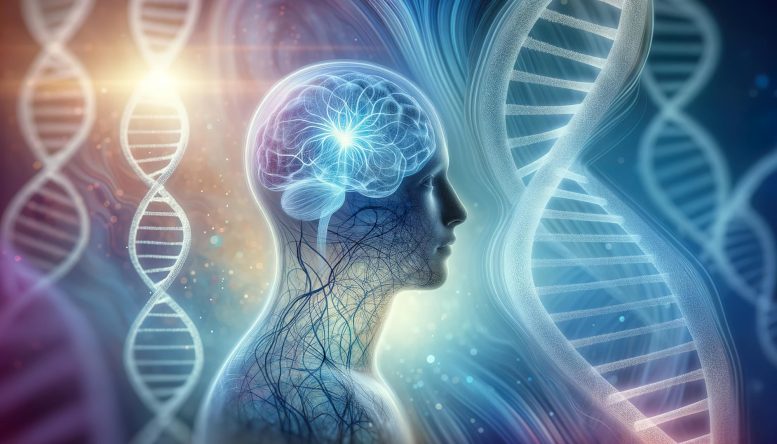
Recent research has found that DNA remnants of ancient viruses in our genome are linked to increased susceptibility to psychiatric disorders such as schizophrenia and depression. This highlights a significant, previously underestimated impact of these viral sequences on brain health.
New research led by King’s College London has discovered that thousands of DNA sequences originating from ancient viral infections are expressed in the brain, with some contributing to susceptibility for psychiatric disorders such as schizophrenia, bipolar disorder, and depression.
Published in Nature Communications, the study was part-funded by the National Institute for Health and Care Research (NIHR) Maudsley Biomedical Research Centre and the US National Institutes of Health (NIH).
About eight percent of our genome is comprised of sequences called Human Endogenous Retroviruses (HERVs), which are products of ancient viral infections that occurred hundreds of thousands of years ago. Until recently, it was assumed that these ‘fossil viruses’ were simply junk DNA, with no important function in the body. However, due to advances in genomics research, scientists have now discovered where in our DNA these fossil viruses are located, enabling us to better understand when they are expressed and what functions they may have.
New Insights into Psychiatric Disorders
This new study builds upon these advances and is the first to show that a set of specific HERVs expressed in the human brain contribute to psychiatric disorder susceptibility, marking a step forward in understanding the complex genetic components that contribute to these conditions.
Dr Timothy Powell, co-senior author on the study and Senior Lecturer at the Institute of Psychiatry, Psychology & Neuroscience (IoPPN), King’s College London, said: “This study uses a novel and robust approach to assess how genetic susceptibility for psychiatric disorders imparts its effects on the expression of ancient viral sequences present in the modern human genome. Our results suggest that these viral sequences probably play a more important role in the human brain than originally thought, with specific HERV expression profiles being associated with an increased susceptibility for some psychiatric disorders”.
The study analyzed data from large genetic studies involving tens of thousands of people, both with and without mental health conditions, as well as information from autopsy brain samples from 800 individuals, to explore how DNA variations linked to psychiatric disorders affect the expression of HERVs.
Although most genetic risk variants linked to psychiatric diagnoses impacted genes with well-known biological functions, the researchers found that some genetic risk variants preferentially affected the expression of HERVs. The researchers reported five robust HERV expression signatures associated with psychiatric disorders, including two HERVs that are associated with risk for schizophrenia, one associated with risk for both bipolar disorder and schizophrenia, and one associated with risk for depression.
Implications and Future Directions
Dr Rodrigo Duarte, first author and Research Fellow at the IoPPN, King’s College London, said: “We know that psychiatric disorders have a substantial genetic component, with many parts of the genome incrementally contributing to susceptibility. In our study, we were able to investigate parts of the genome corresponding to HERVs, which led to the identification of five sequences that are relevant to psychiatric disorders. Whilst it is not clear yet how these HERVs affect brain cells to confer this increase in risk, our findings suggest that their expression regulation is important for brain function.”
Dr Douglas Nixon, co-senior author on the study and and researcher at the Feinstein Institutes for Medical Research at Northwell Health, in the US, said: “Further research is needed to understand the exact function of most HERVs, including those identified in our study. We think that a better understanding of these ancient viruses, and the known genes implicated in psychiatric disorders, have the potential to revolutionize mental health research and lead to novel ways to treat or diagnose these conditions.”
Reference: “Integrating human endogenous retroviruses into transcriptome-wide association studies highlights novel risk factors for major psychiatric conditions” by Rodrigo R. R. Duarte, Oliver Pain, Matthew L. Bendall, Miguel de Mulder Rougvie, Jez L. Marston, Sashika Selvackadunco, Claire Troakes, Szi Kay Leung, Rosemary A. Bamford, Jonathan Mill, Paul F. O’Reilly, Deepak P. Srivastava, Douglas F. Nixon and Timothy R. Powell, 22 May 2024, Nature Communications.
DOI: 10.1038/s41467-024-48153-z
The study was funded by the National Institutes of Health.